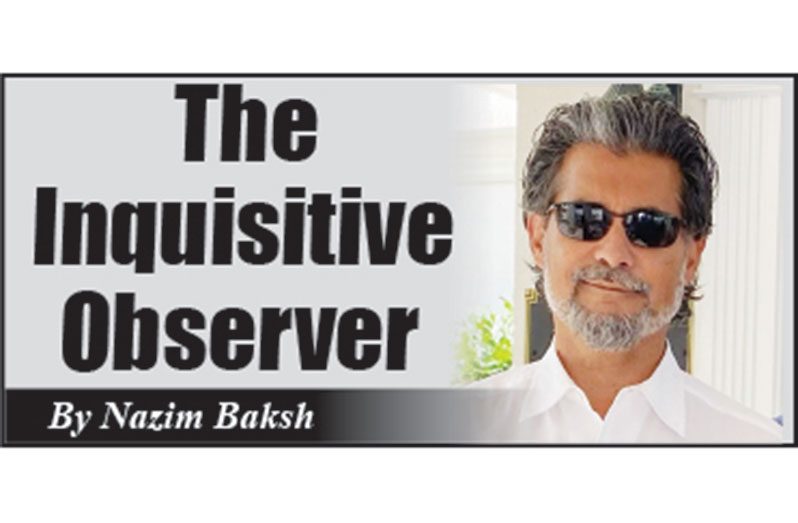AS we edge closer to the end of 2024, I’ve been staring at a map of the Middle East – Syria, Iraq, Lebanon, Jordan, Egypt, Libya, the Gulf States, Iran and Saudi Arabia – and feeling somewhat nostalgic. These were more than just lines on a map that defined the boundaries of nation-states, they also defined power, authority and the predictability of social and political action. The lines are still there, for now, but everything has changed and is changing so rapidly that it is hard to keep up.
The sand has shifted and the faintest whiff that was left of Arab Nationalism has now all but completely dissipated. Following the death of this particular unifying narrative which underscored the politics of the Middle East for over 50 years, I believe pan-Islamism is no longer the force it once was. The implications are massive for the global Muslim community and the ripple effects will be felt even in far-away Guyana, the Caribbean and Latin America, in unpredictable ways.
The demise of pan-Islamism means that political Islam is dead. Jihadism and the last semblance of armed Palestinian resistance is most certainly buried in the rubble of Gaza and the West Bank. Armed Palestinian resistance has been reduced to a proverb – “Sinwar’s stick” – which has come to mean ‘to never surrender.’ With Assad’s Alawite Syrian armed elite forces and Lebanon’s Hezbollah briskly dismantled, the last vestiges of organised resistance are over, cataclysmic events that have left the most ardent Middle East pundits fumbling for words.
The Israeli military machinery is making haste before January 20. It has bombed over 800 military sites in Syria in the last few days. It is on the ground in Syria ripping out harddrives and shipping reams of “secret” documents from Asad’s Ba’athist military intelligence archives to be sorted, studied and analysed. Recep Tayyib Erdoğan, the President of Turkey, whose military aided Ahmad Al-Sharaa’s HTS to take control of Damascus, has asked Netanyahu to pull back his forces. When he refused, Erdoğan pleaded with Washington to no avail.
The consequence is that we can now add Syria and Lebanon to a growing list of failed states that will remain dependent on foreign nations for handouts in the decades to come. The loser in all of this is Iran. Whatever role it believed it was playing a year ago is now over. For the nation that invented the game of chess, Checkmate!
There are no remaining meta narratives that could serve to unite the hearts and minds of Arabs and Muslims. The Muslim world has never been here before and is now treading water in unchartered territory. If Libya’s Col. Mouamar Gaddafi could speak from the grave he would have said, I pronounced the death of Arab nationalism 20 years ago. Gaddafi was one of the champions of Arab nationalism, but in 2003 he didn’t like where things were headed.
Saddam Hussein’s war machine was being dismantled based purely on a heap of lies that tied him to the terror attacks of 9/11. Pre-war Iraq had achieved one of the highest rates of literacy in the entire Middle East and suddenly kids were no longer able to attend schools. Gaddafi could not have predicted the coming Arab Spring, but he may have figured out that a powerful military did not necessarily translate into a secure border. Gaddafi threatened to pull out of the Arab League and he wasn’t bluffing. He set his gaze on pan-Africanism as an alternative to Arab Nationalism. Even that turned out to be a dead-end street.
There was, however, one sentence from Gaddafi’s speech in Tripoli in 2003 that made headlines and it still echoes down to this day. Speaking to an assembly of his female supporters, he said, “These ideas which mobilised the masses are only a worthless currency.”
Gaddafi was referring to the idea of Arab unity, a belief that while Arabs share a common identity, culture, language, and history, these things should never be allowed to stand in the way of political unity.
In the imagination of Sati’ al-Husri, the Syrian Michel Aflaq, Egypt’s Rashid Rida and Gamal Abdel Nasser, the Lebanese George Antonius and Iraq’s Ahmed Hassan al-Bakr, Arabic and the religion of Islam were unifying factors, but pan-Arab solidarity meant resisting foreign occupation and most importantly, supporting the Palestinian cause. In other words, anti-colonialism and anti-imperialism were the cornerstones of Arab nationalism.
Today, the Arab streets are seething with anger, rage, a desire for vengeance over more than a year of genocide in Gaza, but the Arab leadership knows there is nothing it can do without facing devastating consequences. And in the absence of a unifying ideology and a narrative to accompany it, Arabs and Muslims are struggling to locate a centre of political authority. There are no clear answers on the horizon. For the majority who are outraged over Gaza’s genocide, it’s akin to screaming for mercy in the middle of a raging sandstorm.
DISCLAIMER: The views and opinions expressed in this column are solely those of the author and do not necessarily reflect the official policy or position of the Guyana National Newspapers Limited.


.jpg)











